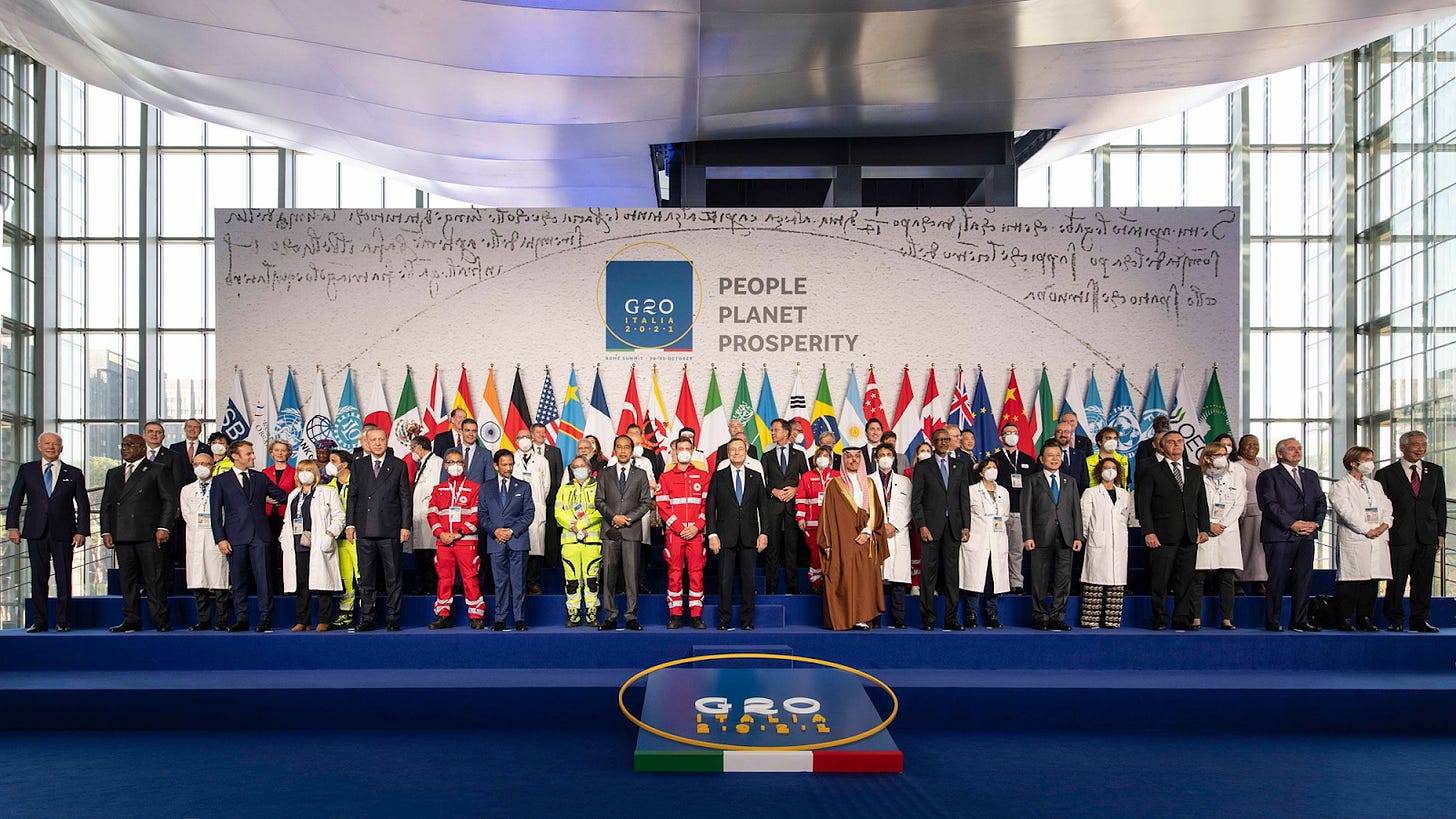Who Is the Leader of Climate Change: Climate, Technology, 6th Plenum, Beijing Stock Exchange
Intelligence and Insights on China's government actions, foreign policy, economy, and the capital markets
A Letter from the Editor
The realist theorists like Owen Harries believe the multilateral fora like the UN serve not to dissipate great power clashes but to disguise them. The constructivist theorists emphasize the transnational challenges that require global coordination, such as climate change.
The US-China relationship can spin into two distinct directions. It can either pursue the realist hard power showdown or preserve humanity from a general calamity through some modus vivendi.
Convened days ahead of the 26th session of the Conference of the Parties (COP26), the G20 meeting differs from its UN conference counterpart in that the mini-lateral G-groups are designed to break the political gridlocks of multilateral negotiations: the global governance model embedded in the G-group architecture relies on the G7 meetings to reach basic consensus amongst the richest nations. The agenda gets passed down to the 20 most powerful developing and developed countries, i.e., G20, for adoption.
President Putin and President Xi joined the G20 and COP26 remotely this year, so the much anticipated Biden-Xi meeting will have to wait. At the G20, Secretary of State Blinken had an (about 1 hour) side meeting with Chinese Foreign Minister Wang Yi, and the readouts from the two sides differed drastically.
The press release from the Department of State is conventional. The Chinese memo made the meeting more pointy and sarcastic. It flags the issue of Taiwan as the “most sensitive one between China and the US, which, if ill-handled, would upheave the relations in their entirety.” The Chinese readouts say both sides agree to keep an open hotline, adhere to the One China policy, and pledge to cooperate on Climate Change. Meanwhile, most media attention in China focused on the anecdote that Blinken was led through a side door at the G20 Chinese venue for such a meeting.
It remains doubtful if the US and China can cooperate on climate change. President Biden frames climate change as an “existential crisis,” President Xi defines it as a major economic opportunity for China.
Even with the climate agenda itself, US-China competition permeates. Both countries strive to compete on the speed of delivering renewable energy revolution, the size of their infrastructure outlays, and the respective strengths in the global renewable energy supply chains. The hard truth is that the pursuit of hard power politics derails climate cooperation. The current state of the US-China relationship is worthy of global concerns in this regard alone.
The joint declaration of G20 leaders turns out to be practical and sensible, reflecting the developing countries’ concerns for pandemic-coping measures, food security, climate mitigation, clean energy, and energy security, which is a far cry from the G7 consensus perceived more belligerent in its statements towards China. In the G20 group photo, President Biden stood proudly and outstandingly and in a very literal sense. He stood on the edge of the stage, to the extreme end of the caucus. The isolationist image contrasts uncomfortably with the commanding tone of November 2021, “America is back and ready to lead the world.”
Short of a firm commitment to achieving tangible benefits to 100+ countries, Biden came indeed “empty-handedly” to COP26. Blocked by President Biden’s own Party Senators Manchin and Sinema, the US is unable to introduce a long-lasting pro-climate investment pact, fulfilling the US’s climate pledge by 2030. The root cause is its lack of domestic support for the green transition, the same reason why the Bush administration left the Kyoto Protocol for which the Clinton administration fought tooth and nail, and the same reason why the Trump administration quit the Paris Agreement of COP21. Biden’s legacy as the world’s climate change president becomes less convincing.
As a matter of fact, the only bipartisan consensus achieved in the US during the Biden administration is recognizing the China threat.
The US Climate Initiative will be more expediently funded on the basis of competing with China.
If the US eventually acts on combating global warming in order to compete with China, it would still be a just move, despite the motivation.
The G20 together represents about 75% of the global economy and 80% of carbon emissions.
Until China moves, it is hard to foresee other major economies being the first mover on climate change. The first mover on climate change undoubtedly incurs massive costs to its own economy for the benefits of the world’s largest polluters, China, the US, and India, in ranking order.
If China must be the first mover on global climate change, we need to begin changing our mindset and treating China as the adult in the room.
Please connect with us on social media, thanks to our digital editors: Ebube Oguaju-Dike and Ifeanyi Eke.
Twitter: @chinabigidea1
Linkedin: www.linkedin.com/showcase/chinabigidea
Also, be sure to join our brand-new discussion groups.
Facebook: China Big Idea
LinkedIn: https://www.linkedin.com/groups/9069127/
Summary of Articles:
Economy
Beijing Stock Exchange Commences Trading on November 15
Chinese SMEs to Benefit from Preferential Policy
Government in Action
6th Plenum May Define Chinese Communist Ruling History into Three Eras
Ministry of Commerce Issues Emergency Notice with Eye Toward Stable Food Supply
China Further Opens its Market for Imports
New Data Law Comes into Effect
International Relations
Beijing’s and Washington’s Opening Remarks at COP26
American, Chinese Diplomatic Heads Meet on Sidelines of G20
FBI, Homeland Security Raid Chinese Tech Firm Related to Cyberattack Investigations
DoD 2021 Report on China’s Military Developments
Top U.S. General Assesses the Taiwan Challenge
Technology
China Applies to Digital Economic Partnership Agreement
Tencent Shows Off Progress in Chip Development
Business
Yahoo Exits China Citing “Challenging Business and Legal Environment”
Capital Market
China Mobile Debuts in Shanghai, Recording China’s Largest IPO in a Decade
Domestic
The Bombshell Weibo Scandal China Tries to Hide
China Sees the Largest Domestic Covid-19 Surge Since the Wuhan Lockdown
Unicorn in Spotlight
Company Profile: Wecash ( 闪银奇异
Keep reading with a 7-day free trial
Subscribe to China BIG Idea to keep reading this post and get 7 days of free access to the full post archives.







